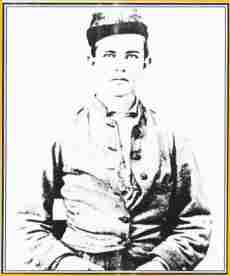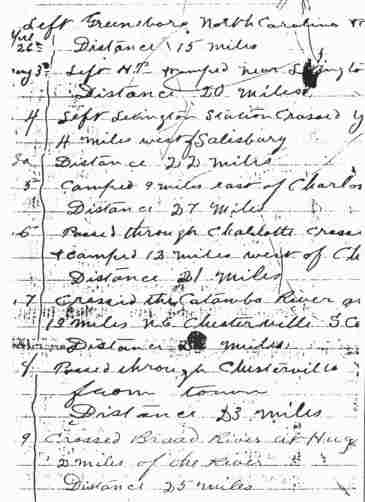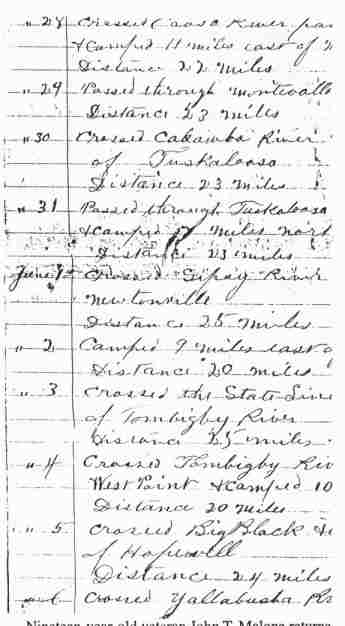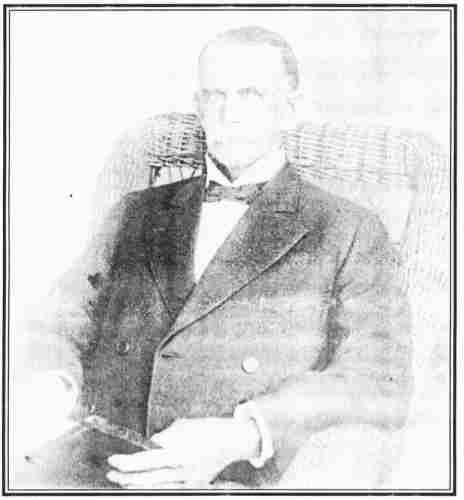|
A SOLDIER’S JOURNEY The Memoir’, Letters and Travel Journal of John T. Malone. A Boy Soldier of the War Between the States by Mary Lou Reed Photos and jourizal courtesy of Nan Tuggle Flinn |

|
|
The summer of 1861 saw great conflict brewing throughout the North and South alike. The United States trained new recruits to help contain the rebellion in the Southern states while newly seceded Southern states mustered men into state militia units to drive the northern aggressors from the newly formed Confederate States of America. Excitement surged through young men of both sides like signals through the telegraph wires. Enlistment was high. Northern and Southern newspapers alike q,uoted politicians and military commanders’ assurances of a speedy war and promises of swift Justice.
Summer came early that year in southwestern Tennessee. As soon as the crops were planted, fifteen-year-old John Thomas Malone begged for his parents’ permission to enlist with the Confederates. Several of his friends had fallen in with Company C of the Thirteenth Tennessee Infantry. John was itching to join the fray before things were settled and the War was over. War was no new concept for the Malone family. John ‘s great great grandfather and namesake fought with Daniel Moran’s 13th Regiment of Virginia Volunteers in the Revolutionary War, An uncle had fought and dkd at the Alamo in Texas. John’s own father, Franidin Jefferson Malone, served in the Mexican VTar as a surgeon less than twenty years previously. His Uncle Harper Malone had already enlisted with an Alabama regiment. The Malones knew well the call of country and duty. So in the summer of 1861, fifteen year old John, with the consent of his parents, traveled from his home on the Tennessee Mississippi border near Memphis to Randolph, Tennessee with the intention of enlisting with the 13th Tennessee Regiment in camp there. John spent several days in camp but was stricken with a severe case of croup. When he made application to Captain John H. Morgan to join Company C, 13th Tennessee Regiment, Morgan insisted he be examined by the regimental surgeon who pronounced John too weak to perform the duties of a soldier. A dejected John returned home to recover, help on his family’s cotton farm and prepare for his studies at Montreath Halls Academy in the fall. He eagerly followed the war through accounts in the Memphis Appeal. Finally, on March 7th. 1862, young John received his chance to serve his country. Leaving their studies, John and several schoolmates traveled to Hernando, Mississippi to enlist as privates in Co. I of the 29th Mississippi Volunteer Infantry Regiment. The company had chosen as a unit name The Desoto Brothers as most of its members were residents of Desoto County and neighbors to the Malones. | |
| VOLUME SIX 1995 | CONFEDERATE VETERAN Page 13 |
|
Here is an autobiographical account of John ‘s service written several years after the war (grammar and spelling occur as in the original in all quoted materials). | |
|
Private John T. Malone joined the Confederate Army at Hernando, Desoto County, Miss. about the 7th of March, 1862 at age 16. Co. 1,29th Miss Regiment formed at Grenada. Company commanded by Capt. J. Bright Morgan, the regiment by Col. C. C. Walthall, the brigade by Gen. Chalmers, division by Gen. Withers, Polk’s Army Corps, Bragg ‘s Army of Tennessee. First fight I participated in was at Farmington, Miss. Then we undertook the Kentucky Campaign. In this campaign we took a part in the battle of Green River at Mumfordville. KY The yankees surrendered this turn to us in regular military form. On then to Camp Dick Robinson. Our command did not take a hand in this battle. VW captured great stores of provisions from the yankees. We were very hungry and made ourselves sick from over eating. We went to Tennessee. On t/is return I became very sick with bronchitis, had no clothes to change, and lay in the hospital about one month at Knoxville, Tennessee. Then I got well enough to join the army at Murfreesboro, Tenn. Here we had our third battle December 30th and3lst, 1862 where Iwas wounded and was sent to hospital at Ringgold, Georgia where I remained about six weeks. Then I joined the army at Atlanta, Georgia where we pressed horses into army service. Then the next was the battle of Chickamauga, Georgia 19th and 20th of September, 1863. (A few days later John lost his knapsack during thefutile attempt to hoidLookout Mountain.) Thirty-two percent of Walthall ‘s Brigade was killed or wounded in thi.’ battle. North Georgia winter campaign of 100 days Ican say, in the language of Gen. Bates, ‘When every moment was a battlefield and every battlefield a graveyard.’For 100 days the cannons thundered and muskets flashed. And for 100 nights the stars looked down on new made graves and new battle lii ies stained with blood. And all of which Walthall ‘s llrigade took a conspicuous part. And so on or an und Jonesboro and Atlanta, this included Atlanta and Jonesboro in the campaign. I went through Atlanta but was wounded twice at Jonesboro, once in the right hip and the left thigh. Then on to the ill fated field of Franklin, Tenn. where |
6000 out of less than 15000 went down.
This was the only battle General Waithall led h brigade in that I was not there. (It should he note that this was ahvays a sore pointfor John afterward Perhaps he felt guilty that so many comrades die in a battle in it’hich he was ordered not to partic pate. Having been temporarily appointed to the rar of sergeant major and not carrying a musket ( sword was told by Major G. W. Reynolds, You wi do no good in this battle, as you have no gun. Gii me your canteen of water, take my horse and go bac to the rear, and report to me at daylight tomorro morning. A disgruntled young John trudged backi the hospital and helped with reception of th wounded all night. At dawn the next morning Joh went back to find Major Reynolds. He found the Major‘s body on the overrun enemy breastwork riddled with bullet holes, five of which were receive in the head.) Then on our retreat on Christmas Eve our br gade had to wade Shoal Creek. The water in some places was up to our arm pits. Rocks so slick th every man had a fall. This gave me a severe chil That night the men who were well enough built pontoon bridge across the Tennessee River for th army to cross on. I was too sick to walk. Next dci they brought me in the ambulance with several othc sick men. When they went to cross the bridge all g off excepting one. I was too sick and said! had soo died for a sheep as a lamb. The bridge was narroi and no banisters and mules were much frightene and did not want to cross. We next went to Greensboro. North Car. Hood was relieved of command the army and Joseph E. Johnson (sic) succeeded I the command of the army. Then he proceeded to n organize the army again. Then Walthall's Brigade consisted of five regiments, 24,27,29, 30 and 31) were consolidated with one regiment under the con mandofCol. R. W. Willaimson. Then Iwas appointe 2nd Lieutenant of Company A, 24th Miss. Regimen acting adjutant and was surrendered in that capac ity on the 26th day of April 1865. Southern arm commanded by Joseph E. Johnson [sic]. The federal army was commanded by Sherman. |
| VOLUME SIX 1995 | CONFEDERATE VETERAN Page 14 |
John was a courageous, steady soldier, well liked by his messmates and whose conduct and valor did not go unnoticed. The youngster received the following commendation but lost his copy along with his knapsack during the "Battle Above the Clouds" on Lookout Mountain on September 24th, 1863. General Edward C. Walthall personally copied this order and sent it to John in 1895 after meeting John’s younger brother Judge Walter Malone in Memphis. The order hung in an honored spot in the Malone parlor from the day it was received until long after John’s death.
|
John, the oldest of eleven children in the Malone family at the time, was the only son to serve in the war. But he received the following letter from his brother William who was three and a half years younger than John. William was in school at Montreath Halls Academy but took a keen interest in the state of affairs in the Confederacy and probably hoped the war would last so that he too might join his brother.
|
| VOLUME SIX 1995 | CONFEDERATE VETERAN Page 15 |
| Later that summer John wrote home: |
|
In the breastworks Near Atlanta, Georgia Aug 10th 1864 My Dear Parents. As this is the first opportunity I have had of communicating with you. I assure you, that it is with pleasure that I embrace it. I am thankful to say that I am safe. I have been sick once since we left Dalton and was absent two weeks but did not miss any fighting. We have been in four different fights since we left Dalton first at Resaca on the 14th and 15th of May, where the enemy charged our breastworks but were handsomely repulsed, one man (James Holland) wounded in the fleshy portions of his arm. He was a member of Co. I. Second on 9th of June. but no one hurt in our company. Our forces charged the enemys works on the 22nd but our Co being deployed on the right as skirmishers, we charged only picket works. consequently no one hurt. We again charged the enemy’s works on the 28 of July and the loss of the Brig. was very heavy though we lost not a man in the old company. It seems that our good luck has changed: since we have been lying in the breastworks the enemy has driven in our pickets, and in the fight M. W. Sullivan was wounded in several places very severely with a shell, and as we were reestablishing our line at night I. H. Bankin was killed instantly. At the time he was shot he was lying on the ground with his head resting on his hands and I was lying near him with my head on his leg. The ball struct him behind the right shoulder ranging down to his heart. Life lasted only one minute. He was one of our best men and was highly esteemed by all who knew him. Yesterday, the ninth, Wm. Peebles was struck with a stray ball above the right eye. Serious, but not mortal wound, the skull being fractured. He was lying nearly sleep behind the breastworks when shot. We have kept close in our works, or we will be in danger of the storm of misles, both miney balls and shells. Not more than 1000 yds from our main line to the enemy’s pickets 400 yds in advance and about 150 yds from the enemy pickets. The Brig, is dwindling away very fast, the 29th Mississippi which when at Corinth in1862 consisted of 1100 men, has now only 125. The other regt’; lost in proportion. The 34th Miss which was the largest regt in the Brig, has now only 55 effective men. Capt Reynolds is now Major of the regt. Wm. Milhouse is well. Nick Malone has been wounded in the hip in the fight of June 22nd. George Critze was killed. Silas Hines was wounded in the arm. Lieut. Blair was wounded also. Frank Stewart was killed about a month ago. He was a captain. Jack is well and sends howdys. Write every opportunity to your affectionate son, John T. Malone |
| VOLUME SIX 1995 | CONFEDERATE VETERAN Page 16 |

When John wrote that letter, he and the rest of the Army of Tennessee knew the end was near. The slaughter at Franklin erased any doubt. Out numbered, exhausted and with minimal provisions they shivered through the winter in North Carolina. In the spring of 1865, General Joseph E. Johnston took over Hood’s Army. But it was too late. The Southern Cause was compromised in April when Lee surrendered the Army of Northern Virginia to Grant at Appomatox. News trickled down through the ranks to John and the few surviving members of the Desoto Brothers. The war was over except for a few formalities and the paper work. John Malone did not wait for parole papers, but left Greensboro, North Carolina the same day his regiment was surrendered. He kept a point-to-point mileage journal on the fifty-five day, 904 mile journey home (see copy of original travel journal and transcription. This is taken from a piece of heavy blue paper of high ragcontent, approximately 8 by 11 inches, written in ink in the hand of John T. Malone. Oral tradition says that this "journal" was kept as he made his way home ifter surrendering at Greensboro, NC. 1865. Route that J.T.M. traveled from Greensboro, North aolina to his home in Desoto Co., MS: |
|
| VOLUME SIX 1995 | CONFEDERATE VETERAN Page 17 |
|
 Nineteen-year-old veteran John T. Malone returned home to meet the two toddlers born to his parents whil he was at war and to help his family and community adjust to the changes that lay ahead. In the fall of 1865 a matured John reentered the classroom, joining thre of his brothers William, James and Robert at Montreati Halls Academy to finish his education. While there, th four Malone brothers were founding members of the Montreath Literary Society to which John was elected president during the 1869-70 school year. John marrie Lou Bonner from Desoto County in 1871. They acquire a fair-sized farm in Capelville, Tennessee near the oh Malone homeplace. John started a walnut orchard an they called their farm Walnut Grove. Tragedy struck thm young couple when their two children died in infancy Lou never recovered from the losses and died in 1881 John never remarried but remained true to the memory of his beloved Lou. For him there was never but one fai face. John put all his energies into his farm and within afew years became a very successful cotton planter. |
| VOLUME SIX 1995 | CONFEDERATE VETERAN Page 18 |
| |||
| John took great pains to maintain correspondences with many of his comrades from the war. He proudly wore the Cross of Honor bestowed upon him by the United Daughters of the Confederacy and attended many of the reunions sponsored by the United Confederate Veterans. Although, he went mainly to observe, as he became very nearly deaf in later years and was embarrassed to find himself in conversations with strangers. He was part of the crowd of veterans from both North and South who met again on the hallowed ground of Chickamauga in 1895, this time to dedicate that field as a joint memorial for the fallen of both sides. While in East Tennessee he took a side trip up Lookout Mountain. He looked out over the peaceful valley where almost thirty-two years before he and the horribly outnumbered Rebels swapped shells with the Yankees in the valley through the fog made dense by the choking cloud of blackpowder smoke of musket and cannon. Perhaps idly, or perhaps purposefully he picked up a piece of wood, a souvenir, which he began to whittle. He carved "Lookout Mt. Tenn." into the miniature stump and napkin ring, tributes to lost friends, lost causes and lost innocence. |
After his wife’s death, John went into business with his youngest sister Ella born during the war. They farmed together maintaining nut orchards, cotton fields and livestock. He inherited the Malone estate from his father with the understanding that he would care for his mother and provide a country getaway for his city-dwelling siblings who included James, author of Chickasaw Nation and mayor of Memphis and the famous poet and judge Walter, author of the poem Opportunity. John left to Ella, his sister and business partner, all his worldly possessions when he died on September 26, 1916, at age seventy. The boy that marched away seeking adventure in 1862 trudged the 904 miles home in 1865, a man who never ventured far from home again except to briefly join others who faithfully served the glorious Southern Cause to pay homage to their fallen comrades and no doubt, speculate how different their lives would have been had the Confederacy maintain its short lived independence. | ||
| VOLUME SIX 1995 | CONFEDERATE VETERAN Page 19 |
